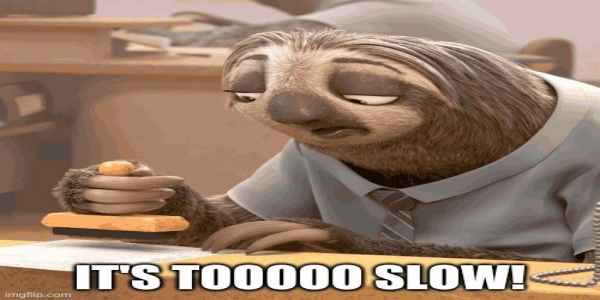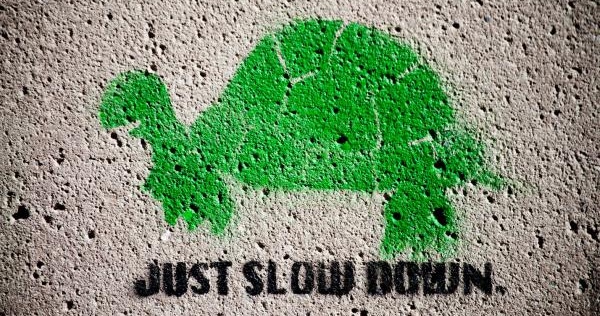Censorship or... EFFICIENT slowness?
Let’s talk about it. Slowly, please.
I have been saying for years that the problems caused by today’s social media would be greatly reduced if, in in a nutshell,
- online “open” discussion among random, large groups of people lost “instantness”
- “Super-influencers”, that is users of social media users with, say, at least one million followers, could only post on the same social media in certain moments, not in real time (details here)
What does this mean?
(please do not get stuck on the actual numbers below! We can tune them some other time, if we agree on the principles!)

The first proposal means that, for example, all the replies to, or “re-shares” of, every tweets, post or comment on YouTube, Facebook, Instagram… would be broadcast to all the other followers of that content with an automatic delay of, say, one or two minutes.
The second proposal means that the “super-influencers” could of course publish everything they wanted, in any moment they wanted, on their own, personal websites. But they could not share and comment with their followers that content on those social media more than, say, 2 to 30 minutes a day.
Censorship!!!!!!
This morning, on Twitter, I got several critiques to both proposal, whose main points are (see the complete thread for details, though!):
- massive censorship. You would… also limit people from sharing everything positive. Can you imagine CgpGray having to cut his videos to 2 minutes be causehe is popular
- limiting how much free speech you are allowed is censorship. And you said influences would only be allowed to interact with your audience for 2 minutes, that means you can only publish something that fits in your publishing window unless explicitly stated otherwise
- You even attack peoples right to communicate with “too many” people. That is some real soviet era censorship. Would effectively kill any formation of political interest groups or activists if they are not allowed to talk. And you don’t deal with self hosted content
- [This] Would kill all form of activism if it gets big
What is censorship, again?
Let’s refresh some concepts, before going further:
- "Political censorship exists when a government attempts to conceal, fake, distort, or falsify information that its citizens receive by suppressing or crowding out political news that the public might receive through news outlets."
- “Censorship of speech is the suppression of speech, public communication, or other information [that is] considered objectionable, harmful, sensitive, or “inconvenient”…"
- “Flooding the public, often through online social networks, with false or misleading information is sometimes called Reverse censorship."
My answer
I never said anything like what is criticised in the first two points above. My proposals (first and second) do not limit “videos to X minutes”, whatever “X” is. There is nothing in them limiting the length of videos, podcasts, posts, whatever.
My proposals do not suppress or conceal any “speech, public communication, or other information”, whatever their content is.
The filters needed to implement them would delay all “messages” in the same way, fairly, regardless of their content or author. And they would only slow them down for the absolute, bare minimum amount of time to give everybody a possibility to think about what they are about to share on a public agora. It would not affect what they can publish on their own websites.
I am 100% sure that, if everybody on every social media voluntarily counted to sixty before posting anything, all the time, everybody could still say everything they really wanted to say, and more clearly too. And we would have at least as much democracy and free speech as we have today, just with ten times less flames, or otherwise pointless discussions. And much less toxic, unnecessary polarization than today.
This is what I am talking about: “social media brakes”, automatically and fairly applied, in a way that would only “hurt” trolls, keyboard warriors, and attempts to exploit events like the US Capitol riots. Something that would fight Reverse Censorship, see above. The social media equivalent of a TV host that gives each of her guests the same, uncensored microphone time, on rotation. It may be wrong, OK. But how it is censorship, by the definitions above?
Would this kill activism?
Another objection I got is that “The web has democratized activism and you want to roll that back”.
My proposals would have no effect whatsoever on the preparation of any march, flash mob, or any other activist initiative. How could they? What meaningful difference could they make, in practice, on preparation?
In real time, that is during e.g. the Arab Spring, or the Capitol riots, or anything in between, yes, I am aware that the “brakes” could make a difference. But:
- on one hand, I have a dream that if people were encouraged to do a bit less of the inflamatory, eventually self-defeating, INSTANTANEOUS “talking” that we see on social media, they may turn to more concrete acting, in ways that actually make a difference. OK, that is just a dream of mine
- On the other, much more practical hand, I have a strong feeling that the “brakes” would make very little difference today
This is not 2011 anymore. Governments have learned well that all they have to do to prevent activist to manage a march or other protests in real time is to just turn off the social media altogether, my brakes be damned.
The concepts behind the proposals
- “Fixing the underlying issues in society is the correct way to deal with polarization."
- “People would not be susceptible to polarizing materials if they didn’t feel there was something very wrong and unjust with how society operates."
The two statements above are parts of the critiques I received, and you know what? Not only I fully agree with them, they are part of the reasons behind my proposals. Here is how I see the current state of things:
- we are not all hysteric, anxious, etc… because social media are istantaneous. We are hysteric and anxious, because real life sucks
- I strongly believe that one “meta-reason” why real life sucks is that is pushes us all to do everything too fast, and to “want” everything now: work, consumption, personal expectations and, yes, debates
- of course we have to defeat the root causes of that hysteria and anxiety, that is to fix real life
- but social media as they are today prevent that progress, instead of actually supporting it
The opposite of frenzy and cacophony is not censorship. It is much clearer, much more effective, still unrestrained thought, discourse and action too. Yes, implementing the kind of “brakes” I suggest may force the “good guys”, in some circumstances, to coordinate themselves in different ways than today. But it would hurt the toxic guys much more.
Because fixing the real, underlying wrongs of society inside, or through the social media of today is like working in an office where everybody must yell as loud as possible, as quickly as possible, while everybody else is doing the same, all the time. It’s not technically impossible, but is a really, really dumb and inefficient way to get any real work done.
Conclusion (for now)
- I am available to speak and work on these topics. Just email me
- I do welcome any further criticism and feedback in general. But please, please please do it in more readable, more open ways than tweets of Facebook comments. Read the proposals, and blog about them anywhere you want, instead. If you have no blog, just email me your feedback, and I will publish it here with full attribution and your contact information.
In the meantime…

<u><em><strong>CAPTION:</strong>
<a href="/tag/slowness" target="_blank">Just slow down</a>
</em></u>
Who writes this, why, and how to help
I am Marco Fioretti, tech writer and aspiring polymath doing human-digital research and popularization.
I do it because YOUR civil rights and the quality of YOUR life depend every year more on how software is used AROUND you.
To this end, I have already shared more than a million words on this blog, without any paywall or user tracking, and am sharing the next million through a newsletter, also without any paywall.
The more direct support I get, the more I can continue to inform for free parents, teachers, decision makers, and everybody else who should know more stuff like this. You can support me with paid subscriptions to my newsletter, donations via PayPal (mfioretti@nexaima.net) or LiberaPay, or in any of the other ways listed here.THANKS for your support!